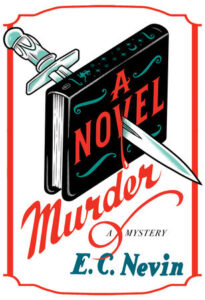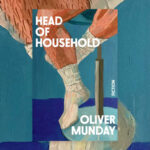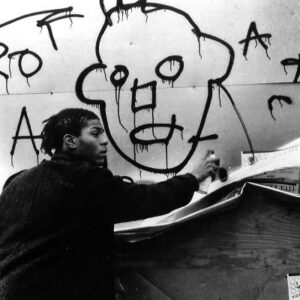‘Where do you get your ideas from?’ the beautician asks me as she ladles boiling hot wax onto my leg.
If you tell someone you are an author, it’s one of the first questions that comes your way, as though there is a secret department store others don’t know about.
‘The Big Ideas Shop? On the outskirts of the city, near the Burger King? They have a two-for-one offer at the moment.’
‘Oh, you know … ’ I answer instead. ‘I read a lot? Ouch!’
The truth is that ideas come from everything you consume – culture, conversations, observations, awkward dinners, humiliating accidents, fabulous parties. It’s perhaps no surprise then that writers, who typically consume a lot of books, are inspired to write about them.
My upcoming book – A Novel Murder – is a cosy crime novel set at a fiction festival. The lead character is a struggling author, and the cast around her is made up of editors, authors, agents, critics and readers.
In my case, it’s fairly easy to see where my ideas have come from. Previously, I was Editorial Director for Crime & Thriller in a major publishing house. This is my world and I know it intimately. I know how the festivals work, I know the gripes of an editor, the fears of an author, the pressures of an agent. Sure, there has never been an actual murder at a festival I’ve attended, but I’ve read enough crime novels to see potential for it everywhere by now.
It’s a book about books, written by someone who’s spent a career surrounded by them. But I still find the ubiquity of the subject fascinating. The Book Thief, Book Lovers, The Midnight Library, The Thirteenth Tale, Yellowface, Fahrenheit 451 … they are endless and varied in their genres and tone, but steadfast in their subject.
So why is it that we so love books about books?
I write about books for myriad reasons other than if being such a big part of my history. One is that there is an immediate connection to the person on the other side. The person about to dive into my work has, by the very act of them setting foot in a bookstore to purchase it, something in common with me. We both love to read. This connection is a delightful tool in a writer’s arsenal. The nods, winks and easter eggs, the allusions to Jane Austen plots and references to genre tropes are fun to write and, I hope, fun to read. As the writer, I feel as though I’m in conversation with a dear friend about a shared hobby.
For example, A Novel Murder opens with my protagonist, struggling author Jane Hepburn, attempting to rearrange the bookshop shelves to display her novels more prominently, but is rather distracted by finding the body of her literary agent on the floor. As she speculates on the shelves filled with violence around her I mention several elevator pitches from well-known novels. I don’t need to name them – a reader will know at least half. They’ll also know which books the literary themed cocktails in the novel refer to, and understand the detective tropes that Jane’s own fictional protagonist fulfils. The reader and I are sharing one big joke, and it’s fun, for both of us.
Another reason I write about books is that, like all authors, I know them. It’s easy and enjoyable to dive into a subject you have a lifetime education on, and interweaving a plot with a background subject you know so intimately is as exciting for me to write as it is for my equally educated reader to untangle. With a mystery, it allows endlessly meta clues. Does a suspicious character’s reference to a literary classic provide a clue or is it a coincidence? In A Novel Murder, Jane understands something from the crime scene that only a book lover will see, and only someone who has spent a lot of time in bookshops could write.
I also know readers like to read about people like them. Representation, when it comes to genders, races, disabilities and more, is important because seeing yourself in a book or on screen is empowering and enjoyable. It is easier to connect with a character with whom you have things in common, and so it becomes easier to feel their emotions and invest in their story. I’m not, of course, saying readers are a protected group (God forbid the hobby becomes that rare!) but I’m still aware that we like to occasionally see the bookworm prosper. Perhaps it reassures us that our love of stories has meaning.
But the fact that both writers and readers like and know books isn’t enough to make sense of why they are such a recurrent subject. Books – unlike so many other hobbies or pastimes – mean more than the sum of their parts. What is the feeling that books produce in us that makes them such a popular topic?
There is something inherently romantic about a novel. Something deeply human – in the way I and many others wish to see what being human means – in a collection of pages, many dog-eared, bound by beautiful cover art. Something comforting about the way you physically turn the pages, shove an old receipt or unwanted business card between them to mark your place (or heretically turn down the corner if you are anything like me). Something warming in the sight of them stacked up, waiting to be read or shelved or simply admired. Maybe this is why ereaders, despite so many people choosing to use them, rarely crop up in fiction. The clean, cold square lacks the wistful promise and romance the physical book has come to symbolize. You can hardly imagine Belle whizzing a long a sliding ladder with a kindle in her hand.
Stephen King described them as a uniquely portable magic, and in today’s fast-paced, tech-dominated world that nostalgic, and yes, portable, magic of disappearing into a story reminds us that there is pure, slow, wonderment still so easily found. It can feel two-fold then, to dissolve into a story about another dissolving into a story. What could be more escapist and more validating than hiding in your room with a book, reading about another doing the same? Especially if the protagonist finds a deep purpose and reason emanating from books that alter the world around them for the better?
In opposition to comfort is rebellion. Yet, these concepts find common ground amongst the pages. From Nazi book burning to today’s removal of LGBT fiction from school libraries, novels have always been political – more so than most hobbies could ever be. Even the lightest romance can be viewed as a fight back against the bleak onwards trudge of consumerism and cynicism.
Many books about books have rebellion and reading intertwined. While pulling you into a story, The Book Thief can simultaneously remind you of the power of the object you are holding. I’m not just a story, it’s saying, I’m a weapon.
It is symbolism of a book then – creativity, political power, humanity, magic, comfort, imagination, education, escapism, rebellion – that makes them so enduring, wide ranging and appealing as a subject. It makes them the perfect subject matter for a character exploring their own limits, passions and identity. They draw us in in a metafictional way, making us truly part of something while we lie on our sofas.
After A Novel Murder, my protagonist Jane Hepburn and her new friends go on to solve more crimes in new bookish settings. The murder mystery is, like all good mysteries, a collection of clues and red herrings, twists and surprises, that add up to an answer. But the characters and, to a certain extent, the plot are driven by a love of books. For me, it’s the perfect backdrop to a story – because how better to create change, to connect with others, and to realise who you are than with a novel? Isn’t that what we want for our characters? And maybe the desire to find that in oneself is exactly why we step foot in a bookshop in the first place.
***


















